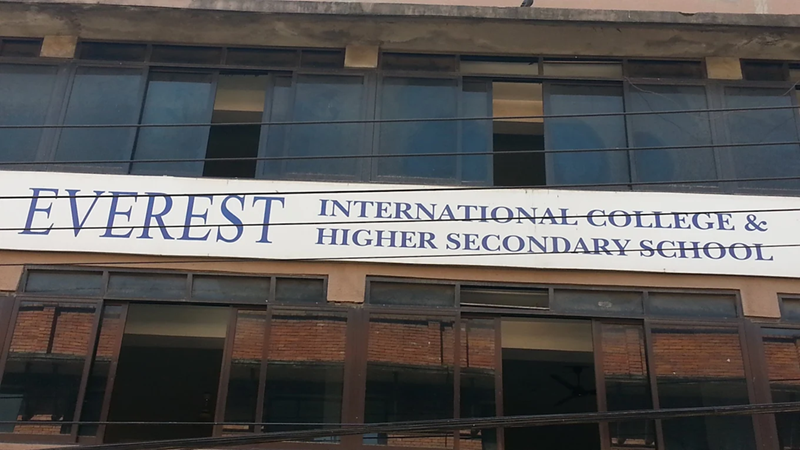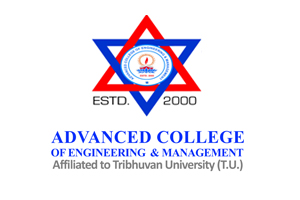Overview
Everest Innovative College Kathmandu serves secondary (+2) and undergraduate learners at Soalteemode, Kalimati. The institution runs NEB +2 Science, Management, and Humanities, and Tribhuvan University programs such as BCA, BASW, and BBS. The college operates under Everest Innovative Education Network and maintains links with national bodies (NEB/TU).
The school section began in 1998 and later shifted operations to the current location in Soalteemode, Kalimati. The college unit offers TU-affiliated bachelor’s programs alongside NEB +2 streams. The stated focus is steady academic delivery, discipline, and student-centred methods.

Quick Highlights
-
Affiliations: NEB (+2); Tribhuvan University
-
Location: Soalteemode, Kalimati, Kathmandu.
-
Programs: +2 Science/Management/Humanities; TU BCA, BASW, BBS.
-
Facilities: AV classrooms, library, science labs, computer labs, sports, transportation, CCTV coverage.
-
Admission Session: +2 intakes per NEB cycle; TU BCA via FOHSS centralized entrance.
Academic Programs Offered
NEB Ten Plus Two (+2)
-
Science: Physics, Chemistry, Biology, Mathematics, English; practical lab work. Streams typically include Physical and Biological groups.
-
Management: Core business subjects such as Accounting, Economics, Business Studies, and applied options per NEB syllabus.
-
Humanities: Disciplines such as Sociology, Psychology, Mass Communication/Journalism, Economics, English.
Notes on +2 delivery: Classroom teaching is paired with internal tests and practicals (where applicable), with final board exams conducted by NEB. Facilities referenced include science labs, a library, and AV-enabled rooms.
Tribhuvan University Bachelor Programs
-
BCA (Bachelor of Computer Application): Four years, eight semesters under TU FOHSS; standard load ~126 credits across programming, databases, networking, and project work. The program runs on English-medium instruction and uses TU’s semester evaluation.
-
BASW (Bachelor of Arts in Social Work): Four-year academic program under TU FOHSS emphasizing fieldwork, research, academic writing, and generalist social work practice.
-
BBS (Bachelor of Business Studies): Four-year FoM program (annual system) covering accounting, economics, statistics, management, and functional concentrations.
Admission Process
+2 (NEB)
-
Eligibility: SEE graduates per NEB norms for respective streams.
-
Process: Form submission with transcripts, character certificate, PP photos, and identity/citizenship as applicable; shortlist and counseling per institutional policy; NEB board registration handled through the school.
-
Intake: Annual NEB cycle; recent +2 admission notices for the institution have run across April–July windows in past sessions.
BCA (TU FOHSS)
-
Eligibility: As per FOHSS, a minimum D in each subject in Grades 11–12 with CGPA ≥1.8, or second division in +2/PCL/equivalent in any discipline (per FOHSS/TU guidance used across colleges).
-
Entrance: Centralized online application at the FOHSS portal with national schedule; exam typically once a year. Current session timelines and portal are publicly available.
-
Selection: Merit based on FOHSS entrance score and document verification at the college.
BASW and BBS (TU)
-
Eligibility: +2 or equivalent per TU rules; some providers apply a minimum threshold (often GPA ≥1.8/second division) and may include interviews. TU conducts the final examinations (semester for BASW at many units; annual for BBS).
Teaching Faculty and Learning Methodology
-
Faculty: A mix of subject specialists for secondary and bachelor levels; TU courses are handled by instructors with experience in their disciplines (e.g., CS for BCA; social sciences for BASW; management for BBS).
-
Methodology: Classroom teaching with tutorials, lab practicums (Science/+2 and BCA), project work (BCA), case discussions (BBS), and fieldwork (BASW).
-
Assessment: Internal tests and assignments alongside NEB/TU final examinations, with semester-end evaluations for BCA and many BASW units, and annual evaluation for BBS under FoM.
Infrastructure and Learning Facilities
-
Classrooms: General teaching rooms with audio-visual support reported in sector listings.
-
Library: Textbooks, reference materials, journals; quiet reading areas commonly provided.
-
IT Facilities: Computer labs for practicals; internet access; BCA labs for programming and networking tasks.
-
Science Laboratories: Physics, Chemistry, Biology labs for +2 practicals.
-
Safety & Security: Listings reference an earthquake-resistant structure and college CCTV coverage.
-
Canteen & Transport: Hygienic canteen and transportation services are available per local directories.
-
Sports & Recreation: Indoor and outdoor activities (cricket, volleyball, basketball, table tennis, badminton, chess) appear in institutional profiles and directories.
Student Life and college Experience
Learners study in a compact urban setting near Soaltee area road links. Clubs and councils support academic and co-curricular interests, while scheduled seminars, workshops, and project presentations add applied exposure.
Field components are central in BASW, and project cycles are mandatory in BCA. Sector entries mention a student council and co-curricular events.
Extracurricular Activities (ECA)
-
Academic: Quizzes, debates, essay and oratory events.
-
Creative: Literature, arts, and media activities.
-
Sports: Team and individual games with periodic intra-college events.
-
Community Links: BASW field placements with NGOs, community groups, or municipal offices (per TU program structure, placements and field reports are credit-bearing).
Scholarships and Financial Support
-
Merit: Entrance/board exam performance-based partial fee waivers.
-
Need-Sensitive: Limited seats for economically constrained students as per policy.
-
ECA/CCA: Support for students with strong achievements in sports or co-curricular fields.
-
Continuity Rules: Scholarship continuation typically depends on attendance, internal performance, and exam results; specific quotas and percentages vary by institution and year.
Achievements and Institutional Milestones
-
History: Originated as a school unit in 1998 at Baneshwor and relocated to Soalteemode, Kalimati, adding bachelor’s programs under TU in subsequent years.
-
Program Expansion: Running NEB +2 in three streams and TU BCA/BASW/BBS at present.
Public sources do not list national rankings; the college communicates routine academic operations and admissions through its web presence and social pages.
Why Choose This Institution?
-
Program mix in one location: NEB +2 and TU bachelor’s programs on the same college.
-
Centralized BCA entrance linkage: Clear pathway via TU FOHSS national portal.
-
Facilities for daily learning: AV classrooms, labs, and library reported across sector directories.
-
Urban accessibility: Soalteemode, Kalimati address with published contact numbers for direct queries.
-
Community and field orientation: BASW program includes fieldwork and research components aligned with TU’s curriculum.
Conclusion
Everest Innovative College provides NEB +2 and TU bachelor programs at a city-accessible location in Kathmandu. Information for admissions, contact, and program outlines is available through public directories, the official contact page, and TU/FOHSS notices. Prospective students can compare streams, review entrance schedules for BCA, and plan document submission ahead of each intake.
FAQ
What bachelor programs can I study at Everest Innovative College?
BCA, BASW, and BBS under Tribhuvan University are listed for the college.
Which +2 streams are available?
Science, Management, and Humanities under NEB.
How does BCA admission work?
Apply and sit for the TU FOHSS centralized entrance (online portal), then complete college-level admission steps upon merit selection.
What facilities are mentioned for day-to-day study?
AV-equipped classrooms, science and computer labs, library, canteen, sports, transportation, and CCTV coverage referenced in sector listings.
Does BASW include fieldwork?
Yes. TU’s BASW structure includes mandatory fieldwork, research, and report writing.
How is BBS structured?
Four-year program with core business courses; assessments follow TU’s annual system under the Faculty of Management.
When do +2 admissions usually open?
Per NEB cycle; a recent public notice for the college referenced an April–July window (session-specific). Check current year updates with the college.
Contact Everest Innovative College's administrative office for detailed information on the course, admissions, location, fees, scholarships, facilities, counseling, or eligibility.
Contact Details
Everest Innovative College
Email Address: everestic1@gmail.com
Phone Number: +977-1-4274590, +977-1-4274593, 977-9851052981
Website: https://eiccollege.edu.np
Location: Soaltee Mode, Kalimati, Kathmandu

















